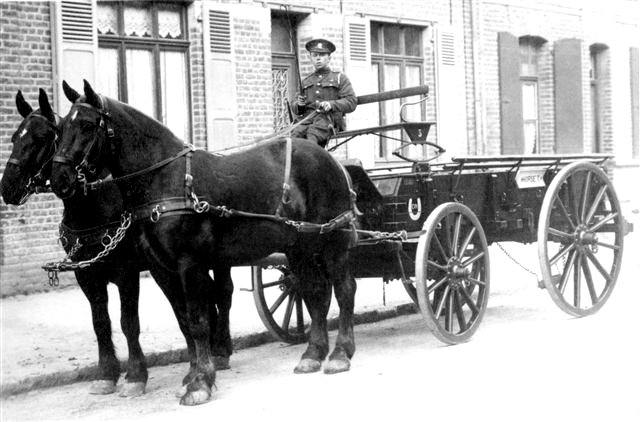Topic: CEF
How Front-Line Rations Arrive
Nerve-Racking Work of the Canadian Army Service Corps
Germans Have Range
Food and Mail Must Be Brought Up Under Direct Fire
Toronto World, 8 July 1917
Paris.—"Give the word to limber up, sergeant-major. And you might tell my groom that I shan't walk my horse this evening. I'll walk instead."
"Very good, sir," says the sergeant-major as he salutes and goes out.
There arises a clattering on the cobbles of the farmyard; voices call out orders; the watercarts are filled; horses are harnessed to their limbers; the mail and the rations are piled on their wagons; and ten minutes later the whole column is standing ready in the dusk, the transport man mounted, the quartermaster, the transport officer, and a sergeant on foot.
The sound of a whistle, a straining of horses, the cracking of a whip, and the transport rumbles and jolts out of the farmyard gate on its way towards the trenches.
Away ahead the first star-shells shoot up and sink slowly in the brilliance to the earth again. All the way along the horizon little sudden pricks of flame come from the enemy's guns, the soft "pop" of bursting shrapnel sounds thru the darkness—for it would be folly to set out before night hid you from German observers, and the "heavies" away on the right crash and rumble and then crash again as they burst among the broken houses. The road—a narrow strip of pave with bottomless, clinging mud on either side of it—is thronged with limbers of other regiments, with cookers, ambulances, A.S.C. lorries laden with tools and trench stores and piles of sandbags, orderlies on bicycles, wounded men on their way back to the field ambulance, and men from hospital on the way back to their units. And thru or with this stream winds the transport officer at the head of his column.
Now and then there is a sudden halt—the enemy are shelling the road a little further up and there is nothing to do but wait. The transport officer fumes to and fro, for he has under his command a dozen men, more horses, and six or seven limbers, all packed tightly together on a narrow road with the Germans shelling in front and an interminable line of transport waiting behind. If the Boche gunners lengthen their range by a hundred yards of so—
"Lead on," comes the word from further up, and the whole road is movement again. The laden limbers crawl along over the pave till they reach a battered old building that looms up thru the night—the dumping ground where the supplies have to be left for the men in the trenches. Privates tramp to and fro with picks and shovels and ammunition; a sergeant is there to see that the rations for the different companies are placed in different piles; a post-corporal hurries hither and thither in search of "D" Company's letters, which have been mislaid, and the transport officer and quartermaster supervise and control everything—always in the most impenetrable darkness, save when a star-shell lights up the white faces, the sweating horses, the gleaming mud.
The transport officer gives the word, and the empty limbers jolt out of the yard on to the road again to join in the stream that flows back towards the billets and sleep.
Night after night there is the same slow crawl along the road pitted with shell-holes, and same halts, the same dead horse and broken limber in the ditch and the same knowledge that, in a moment or so, your own horses may be struggling in their death agony, your own limbers splintered and smashed, your own men lying dead and wounded.
And when the wagons are once more ranged in line against the wall of the farms, when the last of the men has climbed up to the hayloft where he sleeps, the transport officer sighs with relief as he drags off his muddy boots. "Thanks heaven that's over till tomorrow night," he mutters.


